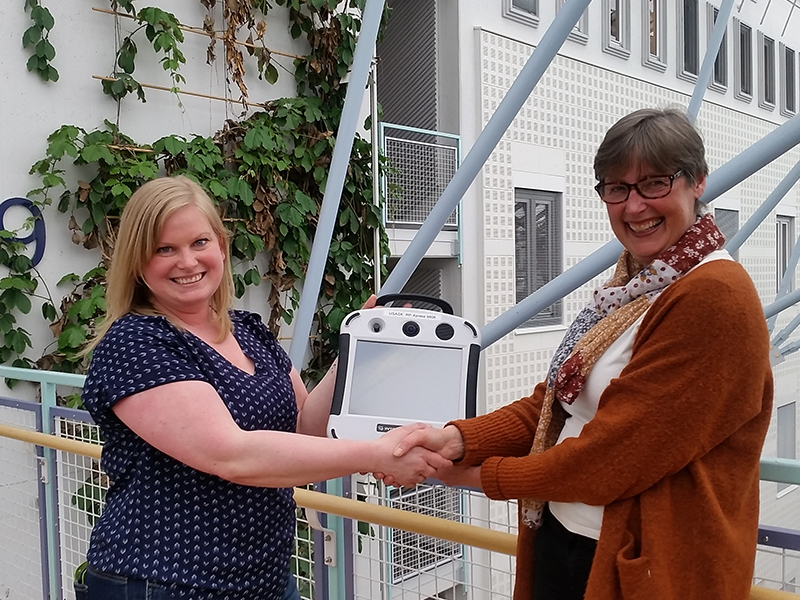
College of Nursing Master's Student Rachel Johnson Travels to Norway
When Rachel Johnson learned of an opportunity, through a research grant from the Northern Nursing Education Network project, to travel to Norway she was ecstatic!
She would now be able to share her knowledge of remote presence (RP) technology, as well as learn about The Arctic University of Norway’s (UiT) Decentralized Learning Program.
Johnson, a master’s student (thesis based) at the University of Saskatchewan (U of S) College of Nursing, is also a nurse practitioner in Pelican Narrows, Saskatchewan where she utilizes RP technology (robot) on a regular basis. The experience of learning with nurses from countries that are leading an international research initiative on circumpolar health fulfills part of the requirements of her graduate program and verifies the meaning of studying within a research intensive university.
Robot (RP-Xpress) in hand, Johnson was welcomed by students and members of the nursing faculty at UiT. The robot is currently on loan to UiT by the College of Nursing.
Enthusiastic about sharing her experiences and knowledge of RP technology to Masters of Health Care Sciences (interprofessional) students, she didn’t waste any time getting to work. Johnson was inspired every day, getting a glimpse of UiT’s Decentralized Learning Program, paralleling the College of Nursing’s Learn Where You Live program, and their work in innovation using telehealth in rural communities. Johnson also learned how Norway faces similar challenges in health care delivery particularly in remote northern communities.
"UiT really is on the cutting edge of telehealth and e-health,” said Johnson. “It was inspiring to see how much emphasis was placed on innovation and inter-sectoral collaboration, both in terms of education delivery, as well as enhancing accessibility of health services to the rural and remote communities. It is clear that they strive to maintain high quality and excellence in education and health care delivery, and embrace novel approaches to break down barriers, including geographical, to improve accessibility to services.”
“Telehealth is key to improving the accessibility and quality of health care services in the north while keeping costs affordable,” said Heather Exner-Pirot, College of Nursing Strategist for Outreach and Indigenous Engagement. “Rachel’s clinical experience with remote presence robotics puts her at the forefront of better understanding the possibilities for the technology in nursing practice. Northern Norway has experiences that we can learn from and apply here and across the Canadian north. The technology exists – figuring out how to put it into clinical practice on a large scale is the difficult part," explained Exner-Pirot.
Supervised by Dr. Lorna Butler (U of S) and Professor Bente Norbye (UiT), Johnson was able to live the process of linking organizational policy change to support new methods of delivering education including how RP technology can be used to improve access to education.
Johnson will once again meet up with two of her colleagues from UiT this summer as they will be attending the 2016 Innovative Learning Institute for Circumpolar Health to be held in Saskatoon and hosted by the U of S August 2 to 12.

